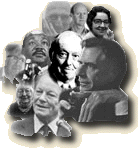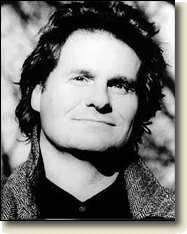| Wade Davis This guy, Sebastian Snow, was 45
years old, and he was one of these fellows who sought
adventure for its own sake. He was the opposite of
Schultes, who always said, "Adventures only happen
to those who are ill-prepared." He sought out
adventures so he had something to write about.
In the course of the
passage, we reached a town midway through the Darién,
which is now approachable by road but it certainly wasn't
then, called Uvesa, where we were taken in by the
guardia civil, who were under the command of Noriega
at the time. They confiscated all of our gear, and they
accused us of smuggling marijuana, which was a completely
nonsensical accusation, but it gave them the excuse to
ferret through all of our gear. They found this huge whack
of money that Sebastian had, several thousand dollars
which, to my astonishment, he had been carrying with him.
They then said they were going to arrange guides for us
for the next section of the passage, which had no trails.
We knew that the guides that they were going to get...
Actually, what happened is,
the guides they brought in did not impress me, and I went
off in a dugout to a missionary, and the missionary met
me at the dock, and he said, "I've already heard
about you. I'm in the course of finding you some Guna
Indian guides, who will not leave you dead in the forest."
That was his first words to me.
That night there was a
horrific storm. Because we realized that the guardia
civil had planned to kill us, we had to escape the
village. Instead, having abandoned all of our gear and
armed only with a couple of rifles lent to us by the
missionary, the next day before dawn, we headed off into
the forest, the opposite direction that they would have
expected us to go, and made our way on towards our
ultimate destination. But in the course of evading the
people we thought might be following us, the three
Indians themselves became lost in the forest, and after
that we ended up wandering for close to ten days.
When you're lost in the
forest, it's not the absolute number of days that matters.
It's the vast uncertainty that consumes every moment.
Eventually, we were down to just a handful of shells and
no food. Remember, this is the rainy season. We've got no
shelter at night, so at night we were just huddling
around smoldering fires in body piles, trying to keep
warm.
We finally ran into a
group of Panamanian fishermen who had come into the
forest from the sea. We looked at them, and we said,
"How do we get to Santa Fe?" which was our
destination, which was the end-of-the-road construction
site of the Pan-American Highway, which was then moving
south. They said, "Santa Fe is two weeks in that
direction." At that point, we knew we couldn't walk
two weeks. Sebastian had sprained both his ankles. We
knew that, at the same time, if we stopped walking, we
would atrophy, and we would die. It was very clear. I had
one of the rifles on my shoulder, and I just started
walking. Not a word was said. I just started walking. We
had to keep going.
I got ahead of the guys,
and as I just came around the bend, a black jaguar leapt
right into the path, and it was about 7 feet from me.
When a jaguar looks at you with those yellow eyes, it's
like you've been photographed. They X-ray you and they
never forget. I just stared into his yellow eyes, and
then he suddenly took two steps towards me and then
jumped back into the forest and disappeared. It was like,
to me, an omen because it turned out that Santa Fe wasn't
two weeks away. It was one day away. Not one day away.
But the end of the road was one day away.
At the end of that
afternoon in a torrential tropical downpour, we shot a
wild turkey, and suddenly I burst onto the end of the
right-of-way of the Pan-American Highway, and I knew in
that moment that we would be safe. It was an
extraordinary moment of redemption and hope. I always
thought that that jaguar, in some sense, had been there
to teach me that things would be okay. I think, in that
sense, it was that idea that I had learned, even early on
in my life when my parents sent me to Columbia at the age
of 14, that it was possible to cast yourself upon the
benevolence of the world and emerge unscathed.
|



